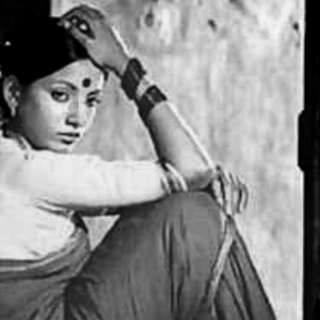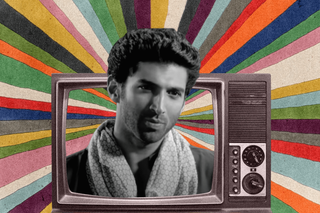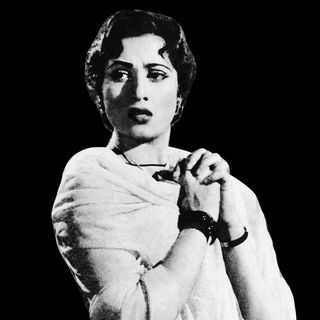
Can We Move On: From the Trope of the ‘Brooding Hero’ Whose Indifference Makes Him Attractive
We have been conditioned to perceive men who don’t express outward emotions — except under the influence of alcohol or in intimate settings — as “strong” and “tough.”

In Can We Move On, we revisit old tropes and question whether they have any remaining cultural relevance.
While growing up, I was besotted with Arjun Rampal’s character in Dil Ka Rishta. He played Jai Mehta, a wealthy young man with a seemingly limited emotional spectrum. To me, Rampal was the quintessential “brooding hero” of Bollywood — his pensiveness being a trait I began associating with attractiveness in males right from fifth grade.
The “brooding hero” trope hardly needs an introduction. This is a character who is “arrogant, proud, brooding, unemotional on the surface, and somewhat antagonistic to the female protagonist in the beginning [perhaps] to create [eventual] sexual chemistry,” as an article on The Artifice describes rather aptly.
I wasn’t alone in my admiration of brooding men; according to a 2016 study, countless other women did the same. It’s hardly surprising given how many of Hindi cinemas’ male leads played angry, difficult-to-read characters — both before and after Rampal. For a greater part of his career, Amitabh Bachchan embodied the trait so often that he came to be known as Bollywood’s “angry young man.” Of late, Sidharth Malhotra and Aditya Roy Kapoor seem to have taken up the mantle — with Malhotra acting in movies like Ek Villain, Brothers, Baar Baar Dekho, and Marjaavaan, among others; and Kapoor embodying the role in movies like Aashiqui 2, Fitoor, Kalank, and Malang, among others. Evidently, the trope has endured well into the 21st century.
Not only that: this particular category of leading men exists outside Bollywood too — think Edward Cullen in Twilight, Christian Grey in Fifty Shades of Grey, Mr. Darcy in Pride and Prejudice, and Chuck Bass in Gossip Girl, among others.
Do you know what’s common between all of them though? Toxic masculinity — an old friend of male protagonists across the globe. Its ubiquity makes one wonder: what drives the universal appeal behind the “brooding hero”?
For me, Rampal’s character in Dil Ka Rishta was a welcome break from Bollywood’s leading men of that era: Hrithik Roshan, Shahid Kapoor, and Uday Chopra played men who were confused about who they loved in Mujhse Dosti Karoge, Ishq Vishk, and Mere Yaar Ki Shaadi Hai respectively; Shahrukh Khan was playing characters consumed by jealousy and insecurity in Chalte Chalte and Hum Tumhaare Hain Sanam; Salman Khan’s character was trying to stalk his love interest into submission in Tere Naam; and characters played by Hrithik Roshan (again) were emotionally manipulating their love interests into marrying their best friends in Na Tum Jaano Na Hum and Main Prem Ki Deewani Hoon.
Related on The Swaddle:
Can We Move On: From the Tropeof the Male Artist Whose ‘Genius’Gives Him a Pass to Be a Jerk
No wonder then that I preferred Rampal’s character. He knew who he wanted to be with, waited for her, wasn’t expressing his love by catcalling her or harassing her through lewd comments, and didn’t hound her to marry him immediately and consummate their relationship. His character wasn’t without flaws though — he did continue to pursue her after she said “no” more than once and stopped only after she let him know she was marrying someone else; not to mention his insistence on drunk driving also killed two people. But, at least, he seemed remorseful. Granted, as a grown woman in the post-#MeToo world, I can’t even begin to justify the character — not even to myself. But as a fifth-grader — unaware of sexism, and the power dynamics between genders — he seemed like the best of the lot to me.
Perhaps, there was internalized sexism on my part too that made me love “brooding heroes.” We have been conditioned to perceive menwho don’t express outward emotions — except under the influence of alcohol or in intimate settings — as “strong” and “tough.” “Considering how society has always either disregarded or dismissed male emotion, it is no surprise stoic behavior has now come to be viewed as an attractive masculine ideal. Stoic-ness exists as a pillar of traditional masculinity alongside competitiveness, dominance, and aggression. The ‘ideal’ man is supposed to be rational and indifferent to crises at all times,” Aditi Murti wrote in The Swaddle. These toxic notions of masculinity look like they played a part in my love for a “hero” who was aloof and needed love to “fix” him.
Unfortunately, the rather evident problem with this trope is that idolizing indifference, rudeness, and apathy in men have negative repercussions on real-life individuals — be it men or women.
“Stories of uncommunicative men who just need to be understood by the right woman can encourage real-life women to tolerate all sorts of emotional abuse and manipulation at the hands of male partners, through a misplaced desire to ‘fix’ them,” Rosalind Moran wrote in 2016. “The truth, however, is that brooding and wrathful men, in reality, are rarely hiding hearts of gold. If they’re repeatedly being rude and horrible, they’re probably just nasty people. Yet the perpetuation of the fantasy of brooding men in stories can impact what women see as acceptable in relationships,” she continues.
Further, some of these “brooding heroes” — like Christian Grey and Shahid Kapoor’s eponymous character in Kabir Singh — are abusive too. The rationalization — and even romanticization — of their behavior has the potential to impact the real lives of real people. “If I’d watched this movie [Fifty Shades of Gray] when I was in an abusive relationship a few years ago… I would have said to myself: ‘If you stay with him despite his abuse, he will change eventually. You will be the one to change him’… I was impressionable, vulnerable, and in love. I would have fallen for this idea of what romance should be,” researcher Emma Marie Smith writes.
Related on The Swaddle:
The Stereotype That Abusers Are ‘Bad’ People Can Prevent Survivors From Recognizing Real‑Life Abuse
Both Moran and Smith are right. I can only speak for myself, but for years, I romanticized emotional unavailability in men, refused to treat their rudeness towards me and dismissive attitude towards my goals as abusive behavior, and even put up with their angry outbursts towards me. This sometimes involved them giving me the “silent treatment,” and at other times, even mishandling my possessions. Why did I stay in such relationships? Well, “brooding heroes” normalized such behavior from men for me.
Simultaneously, by teaching society to idolize stoicism, they harmed men too. These toxic ideals of masculinity can only prevent men from seeking or getting help, but are often at the root of mental health disorders among them too. By forcing them to adhere to “unrealistic and unattainable” norms, they are at risk for stress and depression. As Murti had written: “[T]he emotional labor of portraying a stoic, masculine ideal is a ticking time bomb for physical and mental distress.”
Think about it: instead of sulking, had Abhay Deol’s character in Dev.D expressed his feelings to Paro, his love interest, he wouldn’t have gone down the route of eventual self-destruction. The reason why Shahid Kapoor’s character was brooding in the first half of Jab We Met was that he couldn’t find a healthy way to deal with the emotions of watching his ex-girlfriend get married to someone else. And Aditya Roy Kapoor’s character in Aashiqui 2 was dealing with mental health issues so severe that he ended up dying by suicide.
It’s 2021. We know men have emotions, we know it’s important for people irrespective of their gender to not bottle them up, and we also know men can struggle with mental health too — 70% of the callers to India’s national mental health helpline launched during the pandemic, were men.
So, can we move on from the trope of “brooding” male leads whose lack of emotions makes them “attractive”?
Devrupa Rakshit is an Associate Editor at The Swaddle. She is a lawyer by education, a poet by accident, a painter by shaukh, and autistic by birth. You can find her on Instagram @devruparakshit.
Related


The Buzz Cut: A Roundup of People Who Have Something to Say About Kindness While Ruining The World
